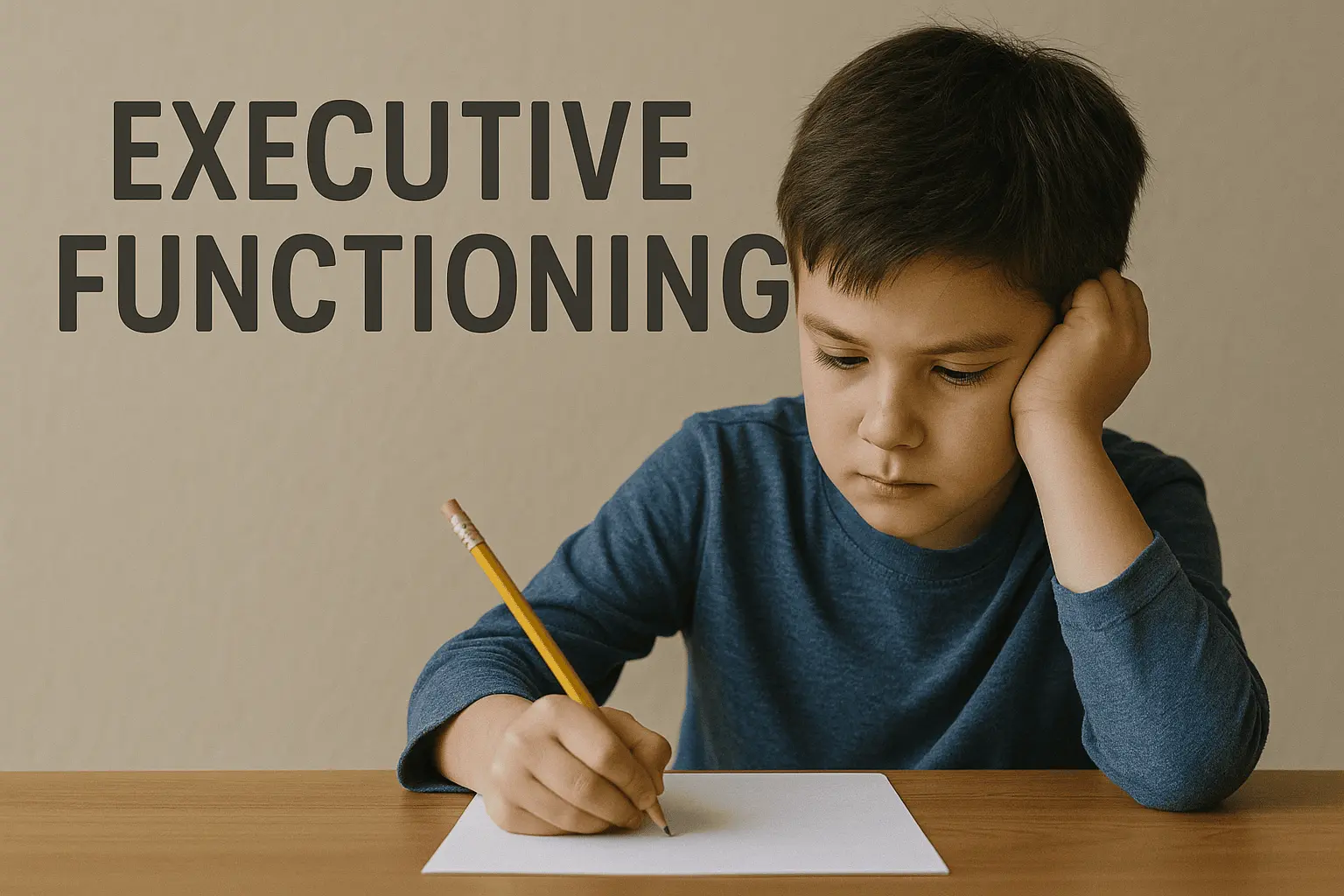Empowering Children with Strong Executive Function Skills
Every child uses a mental toolbox to plan, focus, remember directions, and manage emotions. These tools are part of what we call executive functioning. When these skills are weak, children may struggle with organizing, task initiation, self-control, and maintaining focus. Pediatric occupational therapy can play a significant role in strengthening these skills — helping your child become more independent, resilient, and successful in school and daily life.
1. What Is Executive Functioning?
Executive functioning is a set of cognitive processes that help us:
- Manage attention and ignore distractions
- Hold information in working memory
- Plan, prioritize, and sequence steps
- Initiate and complete tasks
- Regulate impulses, emotions, and behavior
- Adapt flexibly when rules or plans change
- Monitor and self-correct performance
These skills interact and support one another in everyday tasks, from doing homework to managing self-care routines.
2. Signs Your Child May Need Support
You might observe one or more of the following:
- Difficulty starting or completing multi-step tasks
- Easily distracted, forgetful, or impulsive
- Trouble organizing schoolwork, their room, or belongings
- Struggles to follow through on instructions
- Becomes overwhelmed by transitions or unexpected changes
- Emotional outbursts when challenged or when things don’t go as planned
- Problems managing time — either underestimating required time or running out of time
- Trouble juggling multiple tasks or shifting between tasks
These patterns often affect academic performance, social interactions, and daily routines.
3. How Occupational Therapy Supports Executive Functioning
OTs use both direct and compensatory approaches to scaffold executive functioning:
1. Assessment and Profiling
- Use observations, standardized tests, and caregiver reports to identify strengths and areas needing support.
- Determine which executive functions (planning, inhibition, working memory, etc.) are most impacted.
2. Strategy Training & Cognitive Tools
- Teach strategies like chunking large tasks, creating checklists, using visual schedules, or color-coded systems.
- Use memory aids (mnemonics, mental imagery) and self-monitoring cues (check-in questions, timers).
3. Environmental Supports & Modifications
- Simplify surrounding environment to reduce distraction
- Use planners, organizers, reminders, and visual supports
- Introduce external cues (alarms, timers, visual prompts) to signal transitions or steps.
4. Embedding Skills in Meaningful Tasks
- Practice in real-life contexts (homework, chores, school routines)
- Scaffold tasks: break tasks into manageable steps, provide guidance, fade support over time
- Use games and activities that promote executive functions (e.g. puzzles, planning games).
5. Self-Regulation & Emotional Control
- Teach coping strategies for frustration and impulse control
- Use breathing, mindfulness, or sensory tools to regulate emotional states
- Link emotional regulation to executive control — helping children pause and plan before acting
6. Progress Monitoring & Fading
- Regularly track improvements in task completion, organization, and independence
- Gradually reduce external supports as the child gains competence
4. Everyday Activities That Build Executive Skills
You can encourage growth outside therapy visits with fun, purposeful tasks:
- Planning a family outing — break down steps (transport, packing, timeline)
- Cooking or baking — following a recipe in sequence
- Board games or strategy games that require planning, memory, or rule switching
- Time challenges (e.g. “You have 10 minutes to clean this room”)
- Multi-step craft or building projects
- Scheduling and checking off daily to-do lists
- Using timers and timers-based transitions for tasks
These activities make executive functioning practice meaningful and embedded in daily life.
5. When Does This Help Most?
Executive functioning support is often beneficial for children with:
- ADHD
- Learning differences
- Autism spectrum disorder
- Anxiety, emotional regulation challenges
- Traumatic brain injury or neurological conditions
- General difficulty with organization, planning, time management
Early intervention is powerful. The sooner challenges are addressed, the more effectively the child can build compensatory strategies and confidence.
6. Outcomes to Expect
With consistent support and practice, children may show:
- Greater independence with homework, chores, and routines
- Better organization, time awareness, and task completion
- Fewer emotional outbursts or impulsive reactions
- More ability to cope with complexity and change
- Higher academic confidence and engagement
- Improved self-esteem and sense of mastery
Conclusion
Executive functioning is the backbone of a child’s ability to plan, regulate, and execute daily life. Pediatric occupational therapy can scaffold these skills through targeted strategies, environmental adjustments, and meaningful practice. Over time, your child can become more autonomous, resilient, and capable in navigating school, home, and life.

